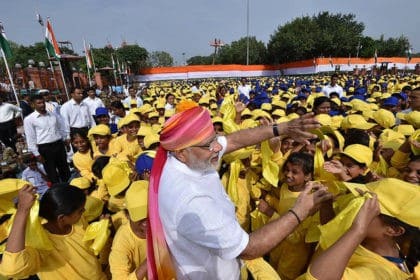What to expect from ‘Modi 2.0’
The 2019 General Election is a landmark in the history of Indian politics, where the BJP, led by Narendra Modi, won 303 out of 543 seats in the lower House of Parliament. This not only betters the 282 seats won in 2014 but secures the BJP an absolute majority without their coalition partners – an extremely rare occurrence in India.

The BJP’s political capital runs deeper still. In 2014 the BJP were reported to have 20 million registered members, in 2019, this is estimated to stand at 120 million, or a tenth of India’s population.
Modi is therefore presented with a very clear and unambiguous mandate to effect major reform. This blog examines the make-up of Modi’s new Cabinet, or ‘Modi 2.0’, and outlines what reforms to expect.
The First 100 Days
The first 100 days will be focused around the Budget, to be delivered on the 5th July by the newly appointed Finance Minister, Nirmala Sitharaman.
At is stands there is anticipation that the budget will make headline changes in direct tax rates. There may be an attempt to lower corporate tax rates marginally and extend the income tax exempt threshold to Rs 5 lakhs (£5,600). To compensate for lost revenue as a result of these changes, the Government may also announce stringent measures to avoid indirect tax evasion.
With unemployment at a 45-year high, the budget will likely be framed around generating employment opportunities. There is likewise an eagerness from the Government to step-up FDI and position India as an ideal place of investment for companies looking shifting base from China.
On data, the new Minister for Communications, Electronics, and IT, Ravi Prasad, indicated that data localisation for international businesses may be contingent on reciprocity – raising expectations that we may see further clarity on Data Protection.
Already, a long-awaited draft New Education Bill has been published outlining the largest restructuring of the sector in decades with opportunities for international collaboration based on global rankings. Indeed, UKIBC led a delegation of UK Universities to meet Minister of State for Human Resource Development, Sanjay Dhotre earlier this week to discuss the Bill.
Modi 2.0’s 100-day agenda is expected to be packed with measures to make a quick impact across industry and for poorer citizens. The Government will want to be seen hitting the ground running.
2022 – is the world ready for India@75?
Whilst the first 100 days will be focused around the Budget, Modi’s sights are set on 2022.
In 2022, India celebrates 75 years of independence, will host the G20, and becomes a member of the UN Security Council. As the eyes of the world fall firmly on India, Modi will want to ensure that what they see is a thoroughly modern and technically impressive country ripe for FDI.
Towards this Modi’s Government is setting out plans to achieve 75 social, political and economic milestones by 2022. These milestones will cover several broad areas including agriculture, the economy, employment, education, infrastructure, railways, health, good governance, inclusive development, women, and cultural heritage.
Despite the best of ambitions, each of these sectors face significant challenges against which progress will require a bold, outward-looking Government with the capacity to take big decisions.
India’s economic relationship with the UK will therefore be rooted in what UK businesses can offer India against these ambitions. Our mutual priorities for trade and investment are likely to culminate against four key areas: deepening the UK-India Tech Partnership, collaboration in aerospace and defence, taking down barriers to financial and professional services, and migration.
Given the electoral triumph, Modi is right to be ambitious. However, although the BJP has a majority in the lower house it will not likely have a majority in the upper house until next year and this will be dependent on performing well in State elections
The emphasis is therefore on generating momentum and securing the political will across coalition partners and throughout the new Cabinet, who we turn to next.
The Cabinet behind Modi 2.0
Modi has appointed 24 Cabinet Ministers, 9 Ministers of State with independent charge and 24 Ministers of State. Despite a 40% change in the roles and composition of his Ministerial team, many of these changes represent faces in his previous Cabinet taking up new portfolios based on their performance to date. As such, his new team indicates a high degree of policy continuity and entrenchment, especially in the ease of doing business reform agenda.
Piyush Goyal, formally Minister of Railways and Interim Finance Minister, is now Minister of Commerce and Industry. New Minister for Defence, Rajnath Singh, was Minister of Home Affairs. Likewise, new Minister of Finance, Nirmala Sitharaman, was previously Minister of Defence and before that she was Commerce Minister.
Although the cabinet appointments stress continuity, six Cabinet Ministers and 13 Ministers of State have been assigned to first timers, indicating that Modi is keen to use fresh thinking.
Several Ministers also wear more than one hat – Modi himself is also Minister for Atomic Energy and Space. This most likely ensures that positions are available to future coalition partners.
Given the massive mandate for Modi 2.0, significant reform across several key sectors in time for 75 years of independence appears more politically achievable than at any point in India’s recent history.
There is therefore expectation and momentum to implement reforms that have until now appeared too politically sensitive including labour, banking, and land reform.
Modi’s approach to the premiership thus far has undoubtedly been ‘minimum Government, maximum governance’. However, his record in power would suggest that wrestling governance has been necessary for Modi in his first term to manoeuvre himself into a place now where significant changes to Government operations and bureaucracy can occur.
His key challenge now will be in managing the expectations of those who have put him in such a powerful position.







